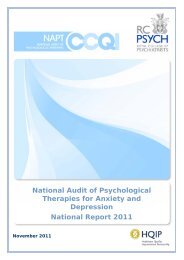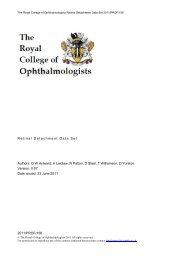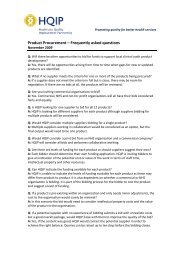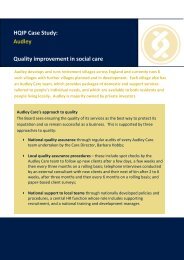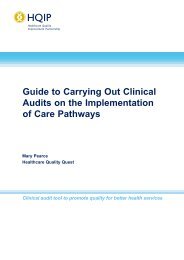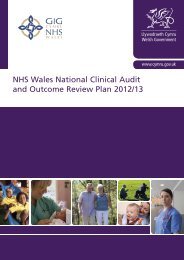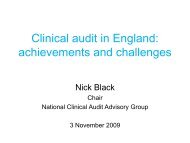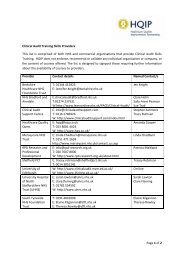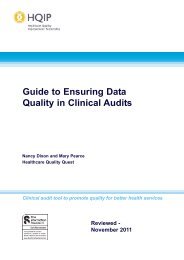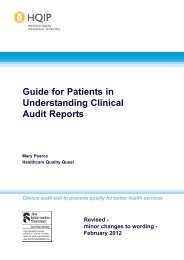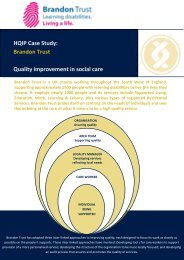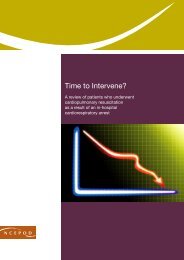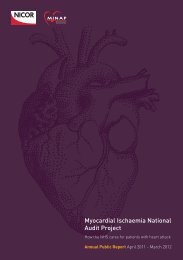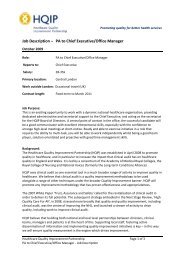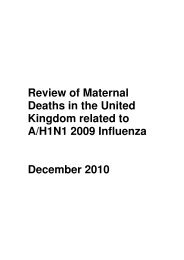Good Governance Handbook - HQIP
Good Governance Handbook - HQIP
Good Governance Handbook - HQIP
You also want an ePaper? Increase the reach of your titles
YUMPU automatically turns print PDFs into web optimized ePapers that Google loves.
8. <strong>Governance</strong> in challenging economic times<br />
What are the lessons for leading and managing during difficult times? Boards will<br />
need to be explicit in their decision making if they are to avoid reputational risk and<br />
judicial review. In 2009 Tayside Health Board considered the following Principles for<br />
Disinvestment:<br />
1. The organisation is committed to improving the health of the community and<br />
the quality, responsiveness and effectiveness of services.<br />
2. The organisation has limited budgets but will work with others to lever<br />
resources from within and outside the community.<br />
3. The organisation will always seek to do the right thing first, and then take<br />
resourcing decisions.<br />
4. We will regularly assess our organisation's position in terms of financial<br />
management, service delivery and strategic change.<br />
5. We will seek to speed up system reform and re-engineering.<br />
6. We will scenario plan for the future, exploring the impact of decreasing<br />
amounts of growth.<br />
7. We will critically review our organisation's priorities and develop plan Bs for<br />
those we cannot put off.<br />
8. We will engage with our stakeholders and communities in decision- making<br />
and share our decisions taken.<br />
9. We will be positive and optimistic.<br />
On the 28 January 2011, Mr Justice Calvert-Smith gave judgment for the Claimants in<br />
judicial review proceedings brought against London Councils 47 . The claim was brought<br />
by Pierce Glynn, solicitors, on behalf of service-users of one of the charities affected<br />
by the cuts. The challenge related to London Councils’ plans to cut £10m from the<br />
£26.4m in funding provided by London Councils to voluntary sector organizations in<br />
London.<br />
The cuts would have affected over 200 voluntary and community sector organizations<br />
in London, and tens of thousands of Londoners. The Judge held that London Councils’<br />
consultation process was flawed and that they had failed to meet their statutory<br />
equality duties. He quashed all the funding cut decisions for the 200 plus projects and<br />
he said that London Councils must re-run the process, this time with full equality<br />
impact assessments.<br />
“This case establishes that even in the current economic climate, it remains of<br />
paramount importance that public sector funding cut decisions are properly assessed<br />
for their gender, disability and race equality impacts. If they are not, public sector<br />
funding cut decisions will be unlawful’. Louise Whitfield, The Claimants’ solicitor<br />
47 Neutral Citation Number: [2011] EWHC 861 (Admin)<br />
www.good-governance.org.uk 37



